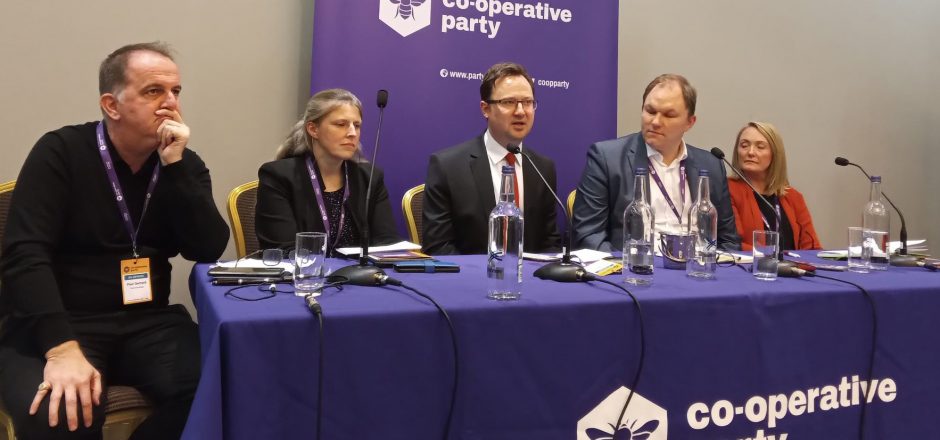When the Co-op Party gathered for its annual conference last month, the gloom and drizzle offered predictable welcome for Leeds in October – but the political weather had taken a dramatic turn, with Liz Truss’s premiership entering its terminal phase and Co-op Party speakers savouring their first prospect of power in a decade.
How this turns out remains to be seen – no election is a safe bet and if Labour does win, its sister party will not be the only organisation lobbying its leaders with a policy list. Those policies will also be tested to the limit as domestic and global crises continue. Still, the Co-op Party conference was marked by a sense of sleeves being rolled up and work to be done, as delegates proposed co-op remedies for housing, energy, food, health and the environment.
The first day opened with a pledge to double the UK’s co-operative economy from shadow chancellor Rachel Reeves, followed by a panel session which looked at how this could actually be done – featuring Rose Marley, CEO of Co-operatives UK, Derek Walker, CEO of Cwmpas, Dorothy Francis of the Co-operative and Social Enterprise Development Agency (Case) and Carl Taylor, director of Redditch Co-op Homes. All four speakers noted the ability of co-operation to empower people.
“It’s enabling people to do what they want to do,” said Taylor of his co-op’s housing model. “It can change people’s lives, it can give people power, it can give communities power … that’s why public housing is so critical and important to the future of this country, and it’s the way out of this crisis.”
He said it was myth that co-op housing would only ever be a niche sector, citing the work of his own co-op in driving a major local regeneration scheme on the edge of town, where innovations include this year’s construction of Europe’s first virtually plastic-free homes.
Francis said that co-op models give people a similar sense of control in their jobs, because they can offer “a democratic return on labour”. She said that in her personal view, doubling the size of the movement was too unambitious. “We should be looking to quadruple. Even if you multiply it by 10 it would still be a small effect.
Related: Rose Marley of Co-ops UK at the Labour and Conservative conferences
“My vision would be a government that actually embodies ideology and terminology into the mainstream, into everything.”
She added: “I think that educators, accountants, solicitors, business advisors need to do more and should be educated and empowered to promote co-ops. And the government needs to take a positive stance regarding co-operatives. I’ve been in the co-op for 14 years, and I don’t think so far, any government has fully put its weight behind the co-op movement.”
Co-ops should be taught at school, said Francis, pointing out that she had only discovered them at the age of 22. “It should be our life, our way of living.”

Walker said growing the movement is “a long-term commitment” that needs the sort of supportive government his organisation – formerly known as the Wales Co-operative Centre – has enjoyed from the devolved national administration in Cardiff. He gave the example of the Social Services and Wellbeing Act, which “places a duty on local councils to promote co-ops and social enterprises and the delivery of social care”. Banc Cambria, the Welsh community bank which is currently in development, would also be “difficult to make happen without government support,” he added.
“It’s not rocket science,” he said. “It needs investment in expert business support to provide businesses with the advice and expertise they need to take forward their ideas.”
Walker said he wished Wales had a stronger economy, “but with the support of the government, we’ve been able to do quite a bit and we’ve seen significant growth over the last number of years. And so we need to replicate that right across to the UK.”
Marley agreed that co-op development needs legislative support, citing the work of the Music Venues Trust in helping communities buy venues; if venue workers could be given more rights to buy it would help to drive the process, she said. Updates to co-operative law would help co-ops with the many technical challenges they face –from barriers to basic essentials like opening a bank account to the loss of Social Investment Tax Relief.
“Employee Ownership gets tax relief,” she added, “which is great. Co-operatives startups don’t and conversions don’t and we need to look at that.”
And competition law causes problems for retail co-ops, said Marley. “if we could look at competition law in the lens of, not fiscal values, but when companies are working together for social value or for climate change, we need to enable that.”
Later in the day, the conference heard of other specifics of how co-op ideas could drive change with government backing. Andy Burnham, Labour/Co-op mayor of Greater Manchester, talked about co-op retrofitting schemes in his region, and the scope to expand co-op provision in food or public transport. “Our movement doesn’t wait for permission, we get on with it,” he said.
Andrew O’Brien from Social Enterprise UK said a Labour victory would give the Co-op Party the chance to reshape the UK economy and promote workplace democracy – and that his organisation would help with this.
Oliver Coppard, Labour/Co-op mayor of South Yorkshire, said: “So much of what co-op movement is trying to do is in line with how I think devolution should operate.”
A fringe session on food justice brought a range of co-op persepectives to bear, with Ed Rosen from Lambeth GP Food Co-op discussing the community gardens organised through NHS surgeries – a response not only to the cost f living and health crises in the UK, but to climate change, “a historic moment of deep threat to life both in the uk and worldwide”.
Sarah McCarthy Fry, member nominated director of the Co-op Group, discussed the food justice work done by the retailer’s member pioneers, its support for community fridges, and its new partnership with Your Local Pantry which will support 32,000 households over the next three years. “Supporting members and communities is what we do and our commitment to food justice is part of that,” she said.
Pam Warhurst, from Incredible Edible, voluntary gardening initiative launched in Todmorden, west Yorkshire, discussed the organisation’s work growing herbs, fruit and veg on public land, notably along the canal path.
She said these are “propaganda gardens – they start a conversation. They are there to interest people in seasonality and pollinators.”
She said there are now 150 groups in the UK and in France, Australia and Argentina. “If you can make food, share it,” she said. “We have the knowledge in our communities to share. And if you have the money to do it, buy local.”
Access to land is an obstacle, so she is now campaigning for a right to grow food bill “that says we have a right to grow food and improve the environment in the public realm. We have the right to think for ourselves what we do on our public land, paid for by our taxes.”
From a party political perspective, Cllr Jack Abbott from Suffolk County Council talked about the methods the Labour group is using to persuade the authority’s Conservative leadership to adopt the Co-op Party’s food justice plan. The proposals went through with Tory amendments which recognised measures taken by the government. Two years on, and Abbott says nothing has been done in terms of action by the council but the campaign goes on. “Be prepared to compromise and seek support to build pressure,” he said.
One of the final fringe sessions looked at co-operative ideas for levelling up the UK, with specific reference to its beleaguered high streets. Two Labour / Co-op MPs – Alex Norris and Rachael Maskell – and a former Labour/Co-op MP, Jo Platt, who has been selected as prospective parliamentary candidate for Leigh at the next election, sat on the panel alongside Co-op Group campaigns and public affairs director Paul Gerrard.
Norris said he was working with shadow chancellor Rachel Reeves on Labour’s response to the government’s levelling up plans – which may be affected by the Conservative leadership change.
He said he was concerned about street rental options. “We don’t believe that landlords should just allow places to sit vacant, derelict. If they do for a period of time, a year in this case, or any 365 days over two years, then the community can step in and seek to use that for a community purpose.
“We have dragged the Conservative government into that space. Whether they stay there remains to be seen, but it’ll give us something to build on.”
Labour would build on these ideas of local empowerment with its community right to buy, he said.

Jo Platt, who is hoping to retake the parliamentary seat of Leigh which she lost in 2019, talked of anger in the town which has seen high street decline. She said after the election she got involved in the redevelopment by a community benefit society of Spinners Mill, a listed Victorian industrial site. Since its refurbishment it has become home to 65 businesses, with another 40 on a waiting list. By offering cheaper rents it has given locals “the space and opportunity to set up business,” she said.
Working in such a space has a transformative effect, she added. “You’ve got all these businesses that are basically working hand in hand or supporting each other. The term the term that we use is ‘commercial to community’ … A lot of these businesses have come in as commercial ventures and then they’ve seen the sort of social good that other organisations are doing and thinking how can I get involved in that?”
The question, she said, is how to replicate this model on the high street and get businesses to co-operate for the greater good; one idea came from the next panellist, Rachael Maskell, who discussed Spark, a CIC running a outdoor community space in York, which is home to start-ups working in food, retail, arts and social enterprise.
“Within that there is a plan around those businesses moving on into the high street so that they can then feed out and create more space for other people.”
With Labour in opposition on the local authority, Maskell said the University of York is doing much of the running in terms of spinning these ideas out on to the high street, setting incubators and accelerators. “They’ve taken over a building in the centre of the city now to really drive that economy. The city which was feeding down and is now definitely lifting up … we’re seeing how you can start regenerating parts of your urban environment.”
From the Co-op Group, Paul Gerrard said bricks and mortar retail is a “foundational” part of communities and which is facing an existential crisis in terms of economic pressures, adding that the business rates, energy and local transport systems were all failing the sector.
“We have been really pleased with what we’ve heard from Rachel Reeves at the Labour conference two weeks ago and again this morning,” he said. “We’d like to see what the detail is.”

